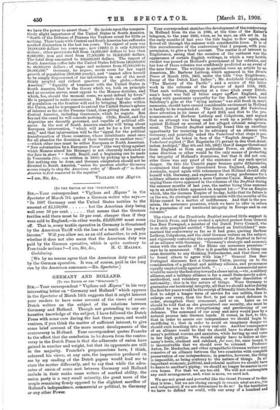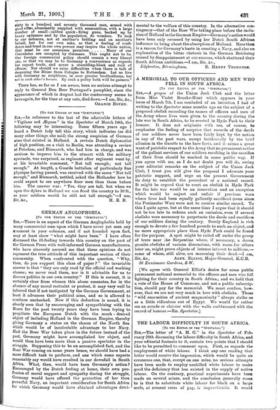GERMANY AND HOLLAND.
[TO THE EDITOR OF THE "SPECTATOR."]
SrB,—Your correspondent " Tigilans sed lEquus " in his very interesting letter on " Germany and Holland" which appears in the Spectator of March 14th suggests that it might interest your readers to have some account of the views of recent Dutch writers on the subject of the relations between Germany and Holland. Though not pretending to any ex- haustive knowledge of the subject, I have followed the Dutch Press with some care during the last three years, and would venture, if you think the matter of sufficient interest, to give some brief account of the more recent developments of the controversy in Holland. Your correspondent quotes Francke to the effect that the conclusion to be drawn from the contro- versy in the Dutch Press is that the adherents of union have gained in number and weight, but that its opponents are still in the majority. Francke's prepossessions have, I think, coloured his views; at any rate, the impression produced on me by my reading of the Dutch papers would lead me to state the matter differently, and to say that while the advo- cates of union of some sort between Germany and Holland include in their ranks some writers of marked ability, the anion party is a very small minority, the great mass of the people remaining firmly opposed to the slightest sacrifice of Efolland's independence, commercial or political, to Germany or any other Power. Your correspondent sketches the development of the controversy in Holland from its rise in 1896, at the time of the Esher's
telegram, to the year 1900, when, as he says, an ebb set in. In the early months of last year the tide began to flow again, and flowed all through the summer with considerable force. It is of this recrudescence of the controversy that I propose, with your permission, to give a brief account. The matter is of interest to Englishmen, seeing that the occasion of the outburst was the appearance of certain English writings, in which a very hostile verdict was passed on Holland's government of her colonies, and her loss of those colonies was confidently predicted as an event of the near future. The writings in question were an article by an American, Mr. Barbour Lathrop, which appeared in the Straits Times of March 12th, 1902, under the title "Our Neighbours; Decay of the Dutch East Indies "; Mr. Archibald Colquhoun's "The Mastery of the Pacific" ; and a review of the latter work in the columns of the Engineer of April 11th, 1902. That such writings, appearing at a time when every Dutch- man's heart was full of bitter anger agffnst England, and aching with passionate sympathy for the Boers, and when Lord Salisbury's gibe at the "dying nations" was still fresh in men's memories, should have caused considerable excitement in Holland is hardly to be wondered at. The Dutch journal Het Vaderlanci drew attention in its issues of April 20th and 21st to the pro- nouncements of Barbour Lathrop and Colquhoun, and argued that an attempt was being made to work up a public opinion against Holland on account of her alleged colonial misgovern- ment. The Utrecht Dagblad naturally found this an excellent opportunity for recurring to its advocacy of an alliance with Germany, and pointedly asked the Vaderland what steps it pro- posed should be taken in face of the "English danger." The Vaderiand replied (" Het Engelsche (?) geyser in den Oost-Aziat- isohen Archipel," May 4th and 5th, 1902) that if danger threatened from England or from any particular Power, an affiance in some direction or other would be the only means of protecting the integrity of Holland's dominions, but that it did not con- sider there was any proof of the existence of any such special danger. On this the Utrecht paper became quite dithyrambic, maintained that danger threatened from England, Japan, and Australia, urged again with vehemence that Holland should ally herself with Germany, and expressed its strong preference for a military alliance as against a mere Customs Union. Many articles urging these views appeared in the columns of the Dagblad during the summer months of last year, the matter being thus summed up in an article which appeared on August 1st:—" For an Empire which, like the German Empire of to-day, holds that its future is on the sea, its strategic and economic union with the mouths of the Rhine cannot be a matter of indifference. And that is the pre- mium, the assurance premium, which we have to offer in return for a guarantee of our territorial integrity in Europe and in our colonies."
The views of the Utrechtsche Dagblad received little support in the Dutch Press, and they evoked a spirited protest from General Den Beer Poraugael, a member of the Dutch Privy Council, who in an able pamphlet entitled " Nederland en Duitschland" sum- marised the controversy so far as it had gone, quoting Barbour Lathrop, Colquhoun, and the chief German writers on the subject, and vigorously contesting the arguments of the Dagblad in favour of an alliance with Germany. "Germany's strategic and economic union with the mouths of the Rhine our assurance premium !" says he in amazement. "How is it possible that such a thing can seem desirable to any thinking Netherlander, and that there can bo found others to agree with him ? " General Den Beer Portugael discusses first a Customs Union, passing on to the consideration of a political and military alliance, and pronounces
equally emphatically against both. " A commercial union would be merely the first step toward a closer union,—viz., a military alliance, and a military alliance is for a small State merely a slow, methodical, and voluntary annexation, or rather dissolution of nationality; this is in the nature of things. Were Germany to guarantee our territorial integrity, all that we should notice during the first few years would be the receipt of friendly hints from Berlin; first to adopt a longer term of service for our militia, then to enlarge our army, then the fleet, to put our coast defences in order, strengthen their armament, and so on. Later on we should be told that as she guaranteed our security, she must be enabled to see to the strengthening and garrisoning of our defences. The command of our army and navy would pass by a natural process into German hands. It comes, in fact, to this, that in order to assure our independence we should begin by sacrificing it ; that in order to avoid an imaginary danger we should rush headlong into a very real one. Another consequence of an alliance would be that we should have to share all Ger- many's political worries and anxieties, while having no real voice in her high politics. We should simply have to follow at Ger- many's heels, obedient and subdued, for ever, for, once bound, it is inconceivable that we should ever be released. Professor Anton, Dr. Heckscher, and other sympathetic German writers may conceive of an alliance between the two countries with complete preservation of our independence; in practice, however, the thing is impossible, as being contrary to the nature of things. In all important economic, political, and colonial matters we should have to dance to another's piping; we should no longer be masterin our own house. For that we are too old. We will not contemplate any such arrangement, and, what is more, we need not.
We are not great and powerful like the Great Powers of to-day, that is true ; but we are strong enough to remain what weave, fres and independent, if we are determined to do so ! In the territories we have to defend we could, with our army of a hundred and sixty to a hundred and seventy thousand men, armed with good rifles, abundantly supplied with ammunition, with a large number of small- calibre quick - firing guns, backed up by heavy oadtance and by the population, do wonders. To look to our defences, not at another's bidding and on another's behalf, but for our own sake, so that a feeling of confi- dence and trust in our own powers may inspire the whole nation, that must be our assurance premium Many of our Consulates are occupied by Germans. This ought not to be. Our foreign commercial policy should remain a very liberal one, so that we may be to Germany a convenience as regards her export trade, and never a stumbling-block and rock of offence. Nor should we raise difficulties when there is talk of deepening the Rhine from Cologne to Rotterdam. Let us live with Germany as neighbour, in ever greater brotherliness, but Rot in each other's houses. By such a policy both will be gainers."
There has, so far as I am aware, been no serious attempt •to reply to General Den Beer Portugael's pamphlet, since the appearance of which in August last the controversy seems to have again, for the time at any rate, died down.—I am, Sir, &c., ORANJE BOVEN.











































 Previous page
Previous page